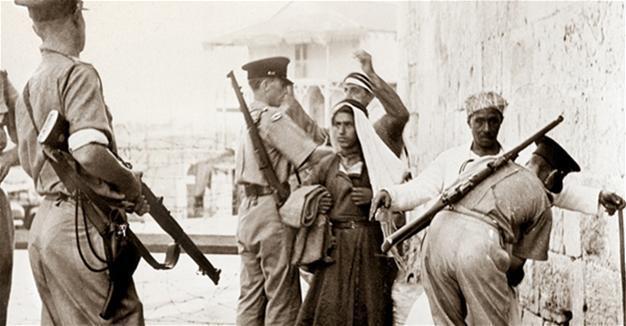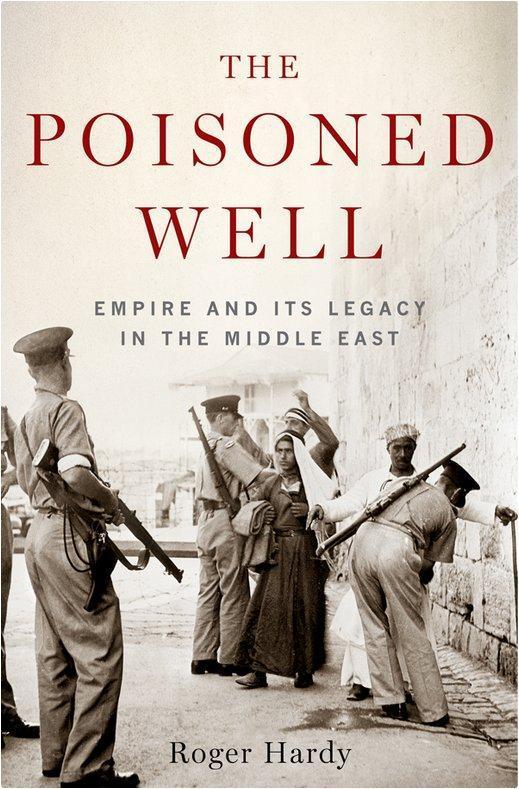Empire and its legacy in the Middle East
William Armstrong - william.armstrong@hdn.com.tr
 ‘The Poisoned Well: Empire and its Legacy in the Middle East’ by Roger Hardy (Hurst, £20, 272 pages)
‘The Poisoned Well: Empire and its Legacy in the Middle East’ by Roger Hardy (Hurst, £20, 272 pages)The centenary of the First World War has prompted much reflection on events
100 years ago. The war’s Middle Eastern theater witnessed
the complete collapse of the old Ottoman system and the emergence of a new order of modern nation states. The effects of that destructive, bloody process are still playing out today. Many are looking back to a century ago to understand the violent flux that again engulfs the region.

The order born from Ottoman rubble was midwifed by Western imperialists. There has been a lot of talk about “artificial countries” and arbitrary “lines in the sand” at the root of today’s problems. But as Roger Hardy writes in “The Poisoned Well,” a vivid account of the half-century between 1917 and 1967, those borders are less important than what goes on within them. “If Western powers are at fault,” Hardy suggests, “it is not primarily for the way they drew the borders of the Middle East after the First World War, but because their interaction with the region ... has often served to accentuate the crisis of the state, rather than helping to resolve or mitigate it.” Today, he argues, “Islamism, the Arab Spring, and global jihadism are the products, not of artificial borders, but the long-simmering crisis of the state.”
Hardy is a former BBC World Service correspondent and a research associate at the Centre for International Studies in Oxford. “The Poisoned Well” is a lively and elegant book full of colorful details. Its 10 chapters knit together the many dramas of decolonization – including the rise and fall of Gamal Abdel Nasser in Egypt and the Suez crisis, the Algerian war of independence, and the founding of the State of Israel.
The book includes a rich cast of eye-witnesses, from Arab nationalists to colonial administrators, from ordinary locals to foreign soldiers and spies. It draws from interviews, unpublished letters, diaries and long-forgotten memoirs. There are many shocking moments, such as when Hardy describes how in Egypt in 1941, a young British soldier received a “word of advice” from a “fatherly old sergeant-major”: "Traffic’s very chaotic in Cairo — so, if you happen to knock down a wog, stop and back over him and finish him off. It’s much the best thing to do. The British will pay compensation to his widow — more than she would ever earn in a hundred years … It saves a lot of form-filling … If you injure a fellow … you wouldn’t believe the paperwork you’ve got to go through.”
But often it was not clear whether imperial elites dominated by cock up or conspiracy. “Much was improvised rather than planned,” Hardy writes. “There was no single uniform legacy of empire. The consequences of colonial rule varied considerably, depending on its duration and intensity and on local conditions.” Aside from naked plunder of natural oil resources, many sincerely believed the only choice was “between wise and efficient British administration and anarchy.” Others were torn between the conviction that Arabs were incapable of self-rule and the idea that indirect rule could nurture an Arab state in which British influence would be exerted “behind an Arab facade.”
The 19th-century Russian writer Alexander Herzen wrote that “the departing world leaves behind not an heir, but a pregnant widow.” Western imperialism is not, suggests Hardy, “responsible for the ills of the modern Middle East. But the Western world has played a significant role in shaping the region and its destiny.” He writes that the character of each country was “shaped indelibly” by the manner in which statehood was achieved: “Why do so many Turks cling to an embattled nationalism? Why is the process of national unification in Saudi Arabia still incomplete? Why is Jordan weak and dependent? Why do Iranians so often detect the hidden hand of Britain in their affairs? In each case the answer, or part of the answer, lies in the circumstances of their birth as modern nation states.”
After the collapse of the Ottoman Empire, Britain held a mandate to rule Iraq from 1920 to 1932. The new state was made up of three Ottoman vilayets (provinces): Basra, Baghdad and Mosul. Knitting them into a coherent whole has always been a struggle, and Hardy includes a striking quote from Faisal I, king of Iraq from 1921 to 1933:
“With my heart filled with sadness, I have to say that it is my belief that there is no Iraqi people inside Iraq. There are only diverse groups with no national sentiments. They are filled with superstitious and false religious traditions with no common ground between them. They easily accept rumor and are prone to chaos, prepared always to revolt against any government. It is our responsibility to form out of this mass one people that we would then guide, train, and educate. Any person who is aware of the difficult circumstances of this country would appreciate the efforts that have to be exerted to achieve these objectives.”
Faisal’s sentiments appear to confirm modern-day chin-stroking about “artificial borders.” But similar dilemmas would also be true if the Ottomans had remained in charge. In a sense, the British mandate period in Iraq continued Ottoman policy by favoring a Sunni Arab ruling elite. “The Shi’a tribes in the south and the Kurds of the north had little reason to identify with the new state, and their deeply-rooted sense of alienation found expression in periodic revolts, put down by the new Iraqi army with help when needed from British troops and planes,” writes Hardy. Those fissures continue to run deep today.
It is difficult to imagine the order that will eventually emerge from the current meltdown in the Middle East. But “The Poisoned Well” is a good place to understand many of the origins of today’s chaos.
* Follow the Turkey Book Talk podcast via iTunes here, Stitcher here, Podbean here, or Facebook here.
 ‘The Poisoned Well: Empire and its Legacy in the Middle East’ by Roger Hardy (Hurst, £20, 272 pages)
‘The Poisoned Well: Empire and its Legacy in the Middle East’ by Roger Hardy (Hurst, £20, 272 pages) The order born from Ottoman rubble was midwifed by Western imperialists. There has been a lot of talk about “artificial countries” and arbitrary “lines in the sand” at the root of today’s problems. But as Roger Hardy writes in “The Poisoned Well,” a vivid account of the half-century between 1917 and 1967, those borders are less important than what goes on within them. “If Western powers are at fault,” Hardy suggests, “it is not primarily for the way they drew the borders of the Middle East after the First World War, but because their interaction with the region ... has often served to accentuate the crisis of the state, rather than helping to resolve or mitigate it.” Today, he argues, “Islamism, the Arab Spring, and global jihadism are the products, not of artificial borders, but the long-simmering crisis of the state.”
The order born from Ottoman rubble was midwifed by Western imperialists. There has been a lot of talk about “artificial countries” and arbitrary “lines in the sand” at the root of today’s problems. But as Roger Hardy writes in “The Poisoned Well,” a vivid account of the half-century between 1917 and 1967, those borders are less important than what goes on within them. “If Western powers are at fault,” Hardy suggests, “it is not primarily for the way they drew the borders of the Middle East after the First World War, but because their interaction with the region ... has often served to accentuate the crisis of the state, rather than helping to resolve or mitigate it.” Today, he argues, “Islamism, the Arab Spring, and global jihadism are the products, not of artificial borders, but the long-simmering crisis of the state.”